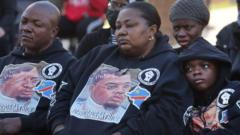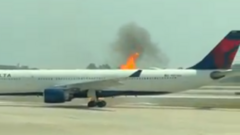In a critical legal development, Boeing faces intensified scrutiny after a US judge rejected its plea deal linked to deadly crashes, raising questions about accountability and safety protocols.
Boeing Plea Deal Over Fatal Crashes Invalidated by Judge

Boeing Plea Deal Over Fatal Crashes Invalidated by Judge
Judicial review finds Boeing’s agreement fails to uphold accountability standards.
Boeing's plea deal, established in July with the US government to resolve allegations linked to two catastrophic crashes that resulted in 346 fatalities, was struck down by Judge Reed O'Connor. The deal included a guilty plea to criminal fraud, independent oversight, and a $243 million penalty. Judge O'Connor criticized the agreement for inadequate judicial oversight regarding the monitoring process, expressing concern over its diversity hiring requirements that could affect public trust. He echoed sentiments from families of crash victims who felt the arrangement favored Boeing without delivering justice. Given the complexity surrounding Boeing’s safety record, this ruling amplifies uncertainties about the company’s future accountability and regulatory compliance.
Moreover, the judge noted failures in the government’s previous oversight, emphasizing that the public interest necessitates court intervention. Following an incident in January involving an Alaska Airlines flight, questions about Boeing’s safety measures have resurfaced, amplifying community discontent. The ruling also holds significant implications for the Department of Justice, which is reevaluating its approach to Boeing amid growing demands for better accountability.
In response to the decision, legal representatives for victims' families hailed it as a crucial win, anticipating a more stringent negotiation on a revised plea deal that reflects the seriousness of Boeing's actions. Judge O'Connor's ruling indicates a pivotal moment in the ongoing struggle between regulatory oversight and corporate accountability, especially in the aviation industry.
With both sides allowed 30 days to propose a new agreement, the future remains uncertain for Boeing as it grapples with the fallout from its past and attempts to reclaim trust in its operational practices.
Moreover, the judge noted failures in the government’s previous oversight, emphasizing that the public interest necessitates court intervention. Following an incident in January involving an Alaska Airlines flight, questions about Boeing’s safety measures have resurfaced, amplifying community discontent. The ruling also holds significant implications for the Department of Justice, which is reevaluating its approach to Boeing amid growing demands for better accountability.
In response to the decision, legal representatives for victims' families hailed it as a crucial win, anticipating a more stringent negotiation on a revised plea deal that reflects the seriousness of Boeing's actions. Judge O'Connor's ruling indicates a pivotal moment in the ongoing struggle between regulatory oversight and corporate accountability, especially in the aviation industry.
With both sides allowed 30 days to propose a new agreement, the future remains uncertain for Boeing as it grapples with the fallout from its past and attempts to reclaim trust in its operational practices.





















